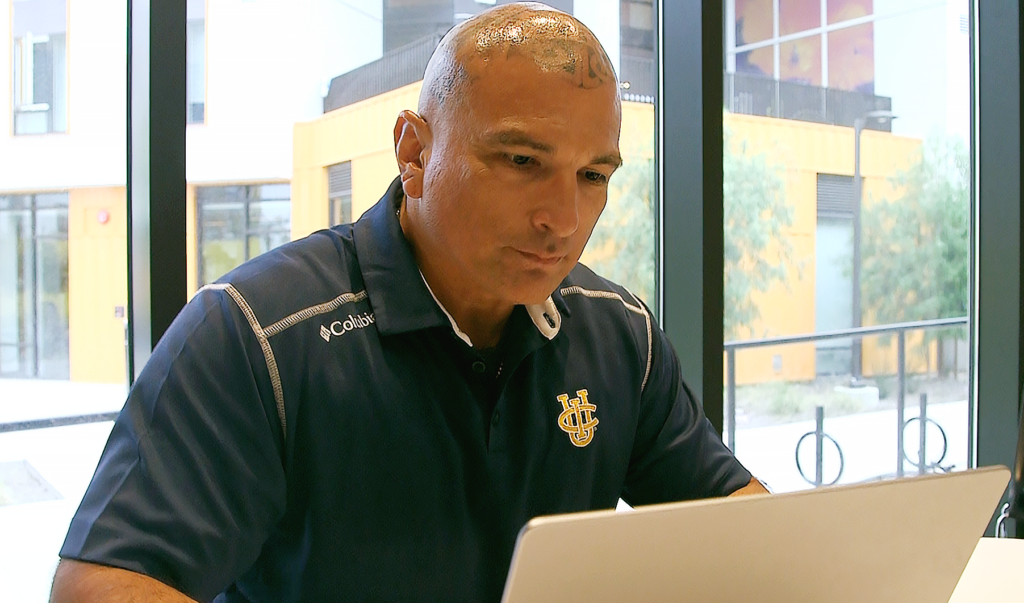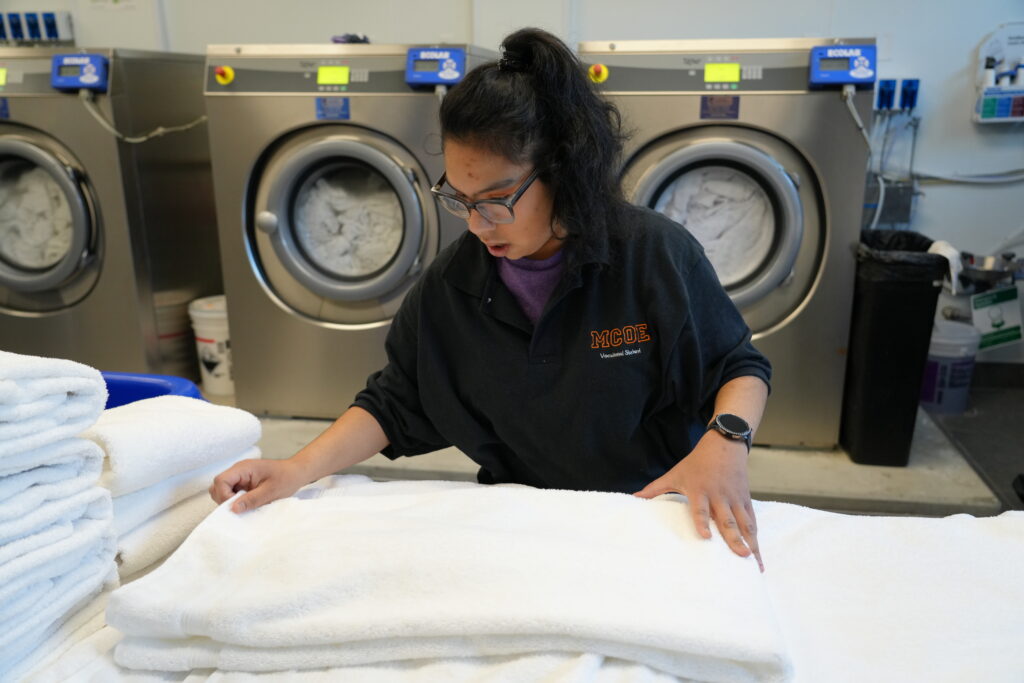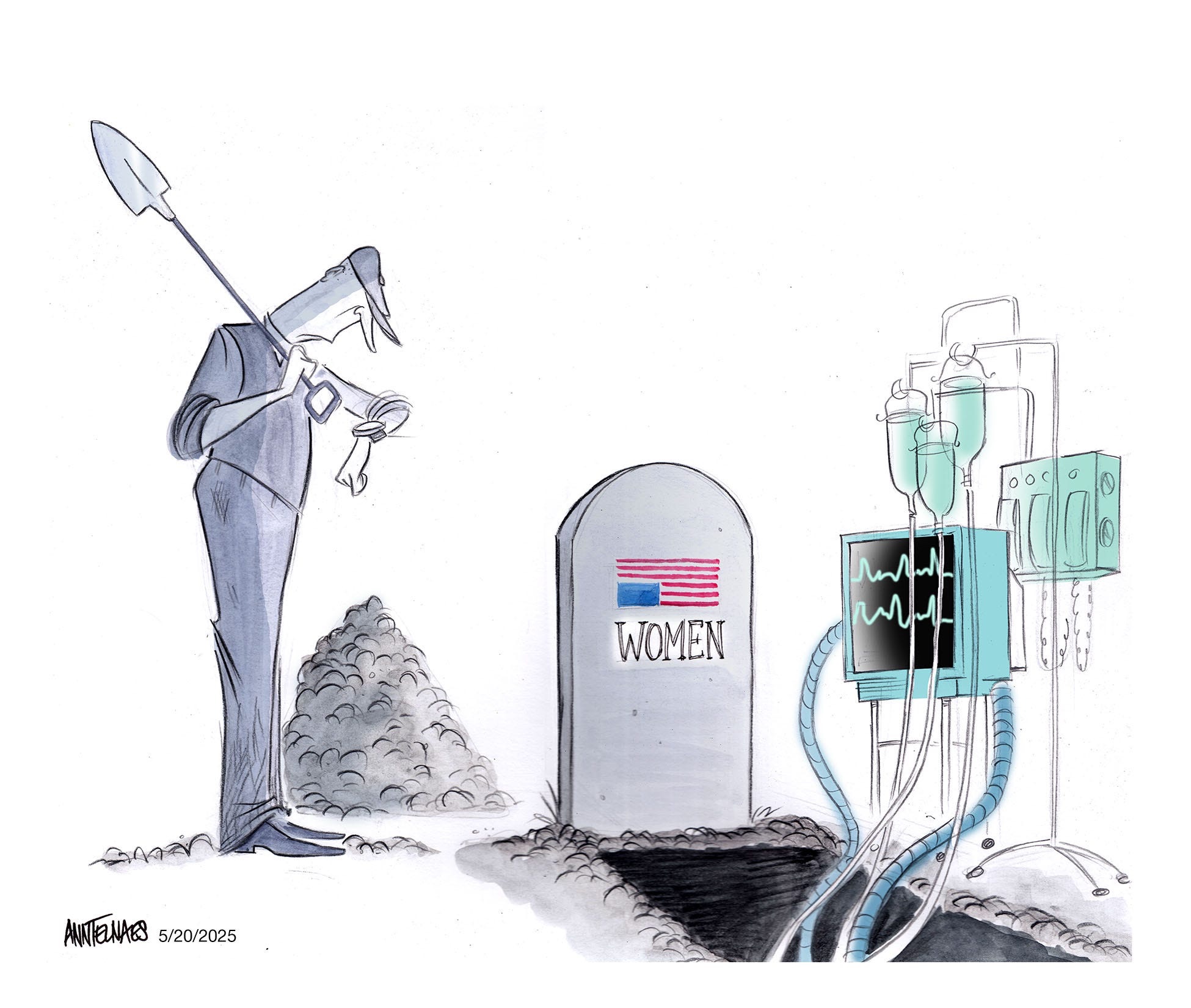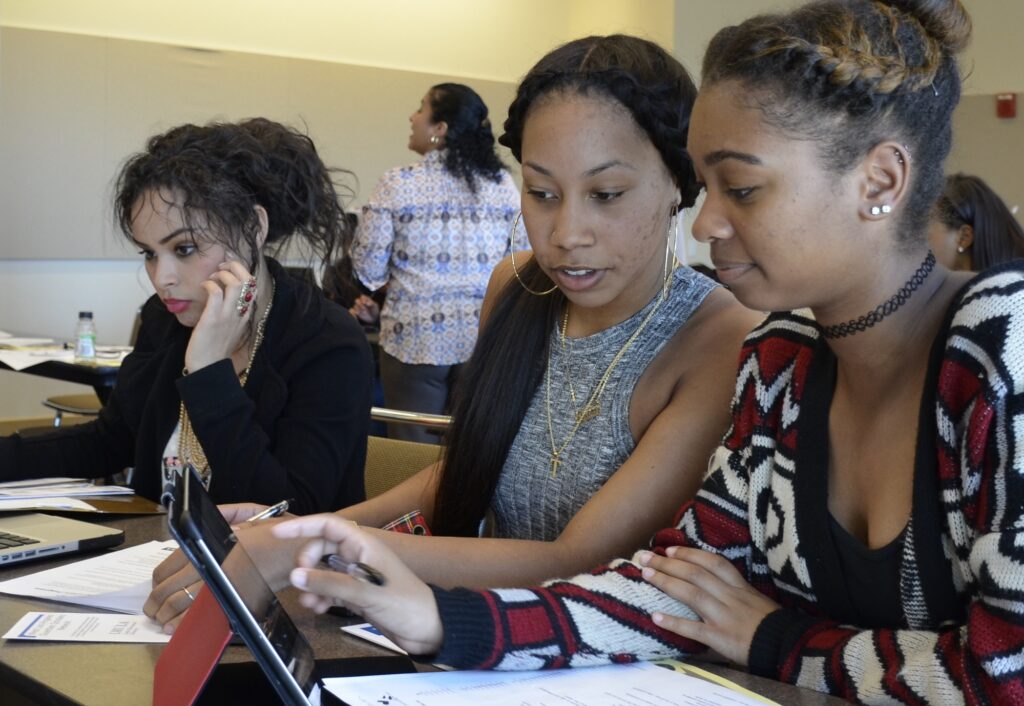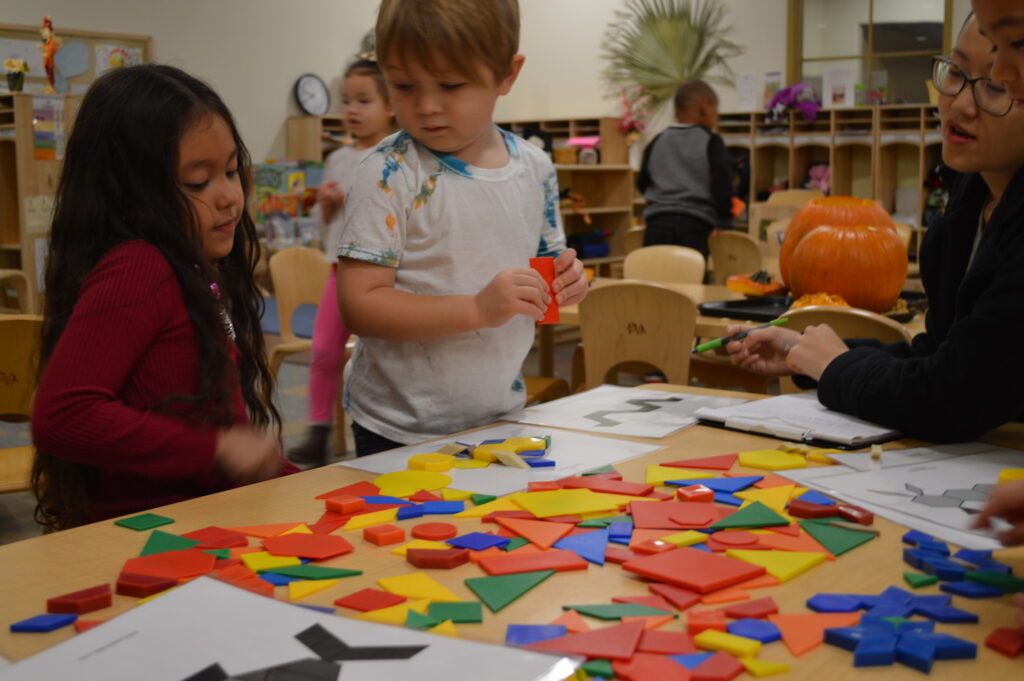https://www.youtube.com/watch?v=ohtTHX9If5M
Patrick Acuña is starting his final year as a social ecology major at one of California’s most prestigious universities. It’s in sharp contrast to his nearly 30 years inside state prisons on a life without parole sentence.
In the year since his release, Acuña transitioned between two historically dichotomous institutions: the prison he believed he would die in and University of California, Irvine brimming with opportunities for a man who completed high school while in juvenile hall decades ago.
“I’m so glad I didn’t get the death penalty,” said Acuña, who faced that sentence at age 19. “I would have never had the opportunity to get an education, to love, to make friends.”
Acuña’s transformation was decades in the making, with education remaining his constant guide.
“I wanted to prove that I was worthy … that I was more than just a prison number. And I wanted to show not just my loved ones, but society, that I was more than life without parole because life without parole is a death sentence and says that you are incorrigible,” said Acuña, 49.
Acuña began earning community college credits nearly two decades ago but didn’t think he’d go further.
“I always aspired to higher education, but it was just not available,” he said. “When Irvine came in with the opportunity to earn a bachelor’s, I wanted to take advantage of that.”
In 2022, the University of California inaugurated its first in-prison bachelor’s program, an expansion of college in prison. The community colleges run associate degree programs in almost all 34 state prisons, and the state university system runs nearly 10 bachelor’s programs. CSU Dominguez Hills is soon debuting the state’s first in-prison master’s program.
By chance, Acuña was not only at the same prison where the program launched but had just completed his second associate degree for transfer, which made him eligible to apply.
He became one of 26 incarcerated people at Richard J. Donovan Correctional Facility in San Diego County admitted to UC Irvine through the Leveraging Inspiring Futures Through Educational Degrees, or LIFTED, program. Their studies are funded by the Blue and Gold Opportunity Plan, which covers tuition and fees for California residents with significant financial need.
Applying was challenging: With restricted internet access, he and his classmates couldn’t submit their own applications or request necessary information, such as Social Security numbers. They relied heavily on LIFTED to apply.
Acuña’s pursuit of higher education, along with involvement in activities like training service dogs, played a significant role in Gov. Jerry Brown commuting his sentence to 25 years to life in December 2018. He was originally sentenced when he was gang-affiliated and a lookout in a robbery that left a store owner dead.
A bill passed in 2018 that provided the chance to retry his case, and a judge found him not culpable for murder. He was released last October and moved to Irvine’s graduate student housing to complete his studies, the first from LIFTED to attend on campus.
He knows some people question why he should have this opportunity when his victim didn’t. “I can’t argue against that because I have personal responsibility,” he said. “I am sorry for what I’ve done, and I do regret what I have done.”
LIFTED became so crucial in Acuña’s life that its staffers picked him up after he was released. Their first stop, at his request, was UC Irvine.
“First thing I learned on campus was that nobody was taking it easy on students in [prison]. I was getting the same education inside that I was going to get outside,” he said.
He quickly learned how difficult the transition would be from studying in prison versus on campus.
With limited technology access, assignments were completed by hand or on highly restricted laptops. The technology barrier made the program far more demanding for students inside, said Acuña, but also presented a significant challenge when he got out because he hadn’t taken part in the momentous technology developments while incarcerated.
He initially felt intimidated. “I could be in a prison yard with a bunch of dudes that are in there for murder, and I was more intimidated sitting in the classroom at a university with a bunch of 19-, 20-year-olds,” he said.
It was the result of feeling like an impostor.
“I felt that I didn’t belong there, that I wasn’t smart enough to be there, that somehow, I was given some sort of leniency to be able to fit into the program, which it turns out is not true, but it felt that way,” Acuña said.
The prison environment was “toxic, highly alpha-driven, male-dominated,” he said. He quickly learned to navigate a distinct campus environment, noting he doesn’t always express himself in politically correct ways.
Perhaps most crucial was support from campus groups for students impacted by incarceration and foster care, which he was in for some time as a teenager. Acuña particularly credits three groups: LIFTED, Underground Scholars and Foster Youth Resilience in Education.
From a grant to fix his car’s transmission to navigating resources to making him feel welcomed, he said the groups “made the landing softer initially.”
“Without those three organizations, I don’t know if I would’ve stayed in school. And if I hadn’t stayed in school, I don’t know if I would still be in the free world,” said Acuña.
For most of his time incarcerated, community college was the only higher education option. Higher education for those inside is becoming increasingly possible, particularly with Pell Grant access recently reinstated.
Still, only about 230 of the state’s 95,600 incarcerated people are enrolled in bachelor’s programs this fall. Being released midway through such programs, as Acuña was, is even less common.
“We engage in education because once we get a taste of it, we understand that it transforms our lives in ways we don’t even initially understand. It broadens our perspective,” said Acuña about attending college while incarcerated. “You see there’s more to life than those blocks that you’re willing to die for and your friends have died for.”
He attributes that transformation as the reason why many of his classmates applied to UCI despite knowing they’ll remain in prison for the rest of their lives.
“One of the harshest things about being sentenced to life without parole… is that it’s a sentence to hopelessness. Every human being needs hope to thrive, to live,” Acuña said. “Whether you can do anything with that education as far as the outside world or career — you get to think and share ideas.”

Turning point in solitary
While in solitary confinement in his early 20s, an older man deeply entrenched in gang culture became Acuña’s mentor. It’s this man whom Acuña credits with setting him on his current path.
“He was guiding me out of the gang culture, but he could not openly guide me out because that would be a death sentence for him,” said Acuña. “He didn’t want me to make the same mistakes he had made and always told me: ‘You remind me of me when I was your age.’”
Acuña received his mentor’s copy of “Meditations” by Marcus Aurelius and read it multiple times, afraid of not knowing an answer if questioned on the book about the musings of a Roman emperor and philosopher.
“There’s this pressure to walk this fine line; it’s like you’re walking on rice paper and trying not to tear it,” said Acuña about navigating prison without getting hurt. But his mentor was uninterested in punishments.
Instead, it became the first book Acuña wanted to read, even as he struggled with then-undiagnosed learning disabilities of dyslexia and dyscalculia.

Courtesy of Patrick Acuña
Patrick Acuña
“Something was awakened in me. I didn’t read better, but I got a taste of new understanding. I was hooked as if it was a drug on education and learning new things,” Acuña said. “That moment really changed my life.”
His mentor died in solitary, as they knew he would, but Acuña holds his lessons close, becoming emotional when he’s mentioned. He no longer has the book; he said a guard discarded it during a cell search.
“One of the last things he did was to help set me on a path that he knew was right, that he wanted for himself, but he was too entrenched to ever make the decision to do anything else,” Acuña said of his mentor. “In the pages of that book, he gave me a gift, not just education but a different life path. Something beyond the life we had lived up to that point.”
The book was filled with life lessons, such as: “Do not act as if you had 10,000 years to live. The inescapable is hanging over your head; while you have life in you, while you still can, make yourself good.”
Soon after, Acuña joined others appealing for education while at the Central Valley’s Corcoran State Prison.
“I started thinking: What does it mean to be a man or an adult?” he said. He saw education as the only way to “show [the next generation] that just because we come from not the best of areas … that they don’t have to travel the path that I traveled and endure the hardships that I endured as a result of it and at the same time have to live with the guilt of harming others.”
He’d struggled through grade school, unable to memorize multiplication charts or read by the third grade. From teachers, he received high marks in effort even as he internalized comments he received elsewhere: “that I didn’t try hard enough, I was just stupid, I’ll never be any good,” he said.
It took meeting his mentor in prison to give school another chance.
Acuña can’t recall his first interaction with police. He grew up in the South San Gabriel neighborhood of Los Angeles during the 1980s gang epidemic, where such contact was incessant.
“When we start peeling away the layers of when was the first time you came into contact with a policing system, for many of us, it’s almost impossible to say,” Acuña said.
This was the “juvenile superpredator” era, a title that politicians and the media took from influential political scientists and used to denote boys as progressively violent, even as youth crime declined.
Paired with negative academic experiences, Acuña saw few options for his future. “It was either military, labor jobs, or prison … and a lot of it was prison,” he said about the adults in his family.
“I kind of just fell through the cracks and wound up getting involved with other students that were probably falling through the cracks,” said Acuña. “And eventually that led to anti-social behaviors, gang affiliation, more crime and prison.”
Acuña, who identifies as Native American and Latino, was first arrested at 14 for robbery. He remained tied to the justice system through his teenage years. Then, at 19, he was arrested for murder.
“The damage I did was irreparable and so far-reaching that it goes beyond what I can imagine, and that’s just the immediate victim and the family,” Acuña said during a 2020 parole board hearing.
His attorney described Acuña that day as having transformed “from a violent, scared, damaged, terrifying young gang member to an upstanding person, a man with respect, integrity, who can be part of our society and give back to others.”
By then, Acuña had internalized the wide impact of crime on communities. He remains in school to reduce the damage.
Studies have long shown that education access progressively reduces recidivism rates, which also reduces incarceration costs. “If you can’t see it from a moral perspective, see it from your pocketbook,” Acuña said.
There are many inside prison who are “languishing and have so much to offer,” he said. But because of “cruel and unusual” sentences like life without parole, he added, they don’t get to show any of their rehabilitation.
“As somebody serving the sentence of life without parole, you have no incentive to educate or stay out of trouble — yet they’re doing it,” said Acuña. It shows they’re not incorrigible, can be rehabilitated and deserving of having their cases reviewed, just as his was.
There was a time when he needed to be in prison, he acknowledged, but “did I need to be there indeterminately? No.”
Acuña currently advises professors teaching inside prisons and is a service-dog trainer; there was a time when he wanted to pursue a career in veterinary medicine. He isn’t sure what he’ll do after completing his degree, but he knows he’s staying in school. He’ll now have options: Those studying in prison are limited to the majors offered to them, most often in the humanities.
“You think there’s nothing else out there because you can’t see past those city blocks that there’s a whole world out there and you have every right to it,” Acuña said of his early life. “You don’t have to be redlined and cast aside, you don’t have to be cheap labor. You have options. And the key to that is education.”
Jennifer Molina produced the video for this story.
